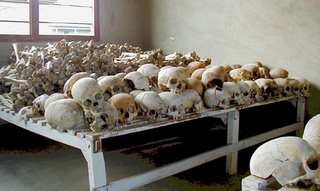Genocide on Clinton's watch, genocide on Bush's watch

From an Africa Action report carried on The Black Commentator:
"During President Bill Clinton’s trip to Africa in 1998, he stopped in Kigali, Rwanda, to deliver an apology for not having done 'as much as we could' to stop the genocide in 1994. He announced to an audience at the Kigali airport, '[A]ll over the world there were people like me sitting in offices, day after day after day, who did not fully appreciate the depth and the speed with which you were being engulfed by this unimaginable terror.'[3]
"In fact, there exists a great deal of evidence to suggest that detailed information on the scope of the genocide was indeed available to the U.S. – both before and during the massacres in Rwanda. Reports suggesting a high likelihood of massive ethnic violence had been available even during the early 1990s. In January 1994, U.S. intelligence analysts had predicted that in case of renewed conflict in Rwanda, 'the worst-case scenario would involve one half million people dying.'[4]
"In the final analysis, even these dire forecasts proved to be conservative.
"On April 6, 1994, the same day that Rwandan President Habyarimana’s plane was shot down and the crisis began to unfold, Deputy Assistant Secretary for African Affairs Prudence Bushnell drafted an urgent memo to Secretary of State Warren Christopher. In it, she warned that the assassination could prompt an outbreak of killings, and she urged the U.S. to appeal for calm.[5]
"Within days, Joyce Leader, Deputy Chief of Mission stationed in Rwanda, realized that a pattern of clear and systematic killing of Tutsi had emerged.[6] Lists of the names of Tutsi and some Hutu targets had been compiled and distributed, and blocks were being set up along the roads to check people’s identification papers and separate those who would be eliminated.
"Recognizing the extreme danger on the ground, the U.S. made the decision to evacuate all American citizens from Rwanda. By April 10, 1994, the U.S Ambassador to Rwanda David Rawson and 250 American citizens had been evacuated from the country.[7] Memos prepared for U.S. officials in subsequent days warned of a massive and impending 'bloodbath'.[8] Though fully briefed on the unfolding crisis, the Clinton Administration took no action to halt the growing violence, and instead began to lobby for the withdrawal of the UN force in Rwanda.[9]"
Samantha Power writes: "So far people have explained the U.S. failure to respond to the Rwandan genocide by claiming that the United States didn't know what was happening, that it knew but didn't care, or that regardless of what it knew there was nothing useful to be done.
"The account that follows is based on a three-year investigation involving sixty interviews with senior, mid-level, and junior State Department, Defense Department, and National Security Council officials who helped to shape or inform U.S. policy. It also reflects dozens of interviews with Rwandan, European, and United Nations officials and with peacekeepers, journalists, and nongovernmental workers in Rwanda.
"Thanks to the National Security Archive (www.nsarchive.org), a nonprofit organization that uses the Freedom of Information Act to secure the release of classified U.S. documents, this account also draws on hundreds of pages of newly available government records.
"This material provides a clearer picture than was previously possible of the interplay among people, motives, and events. It reveals that the U.S. government knew enough about the genocide early on to save lives, but passed up countless opportunities to intervene."


Comments
http://www.youtube.com/watch?v=68XlAMy0k-s